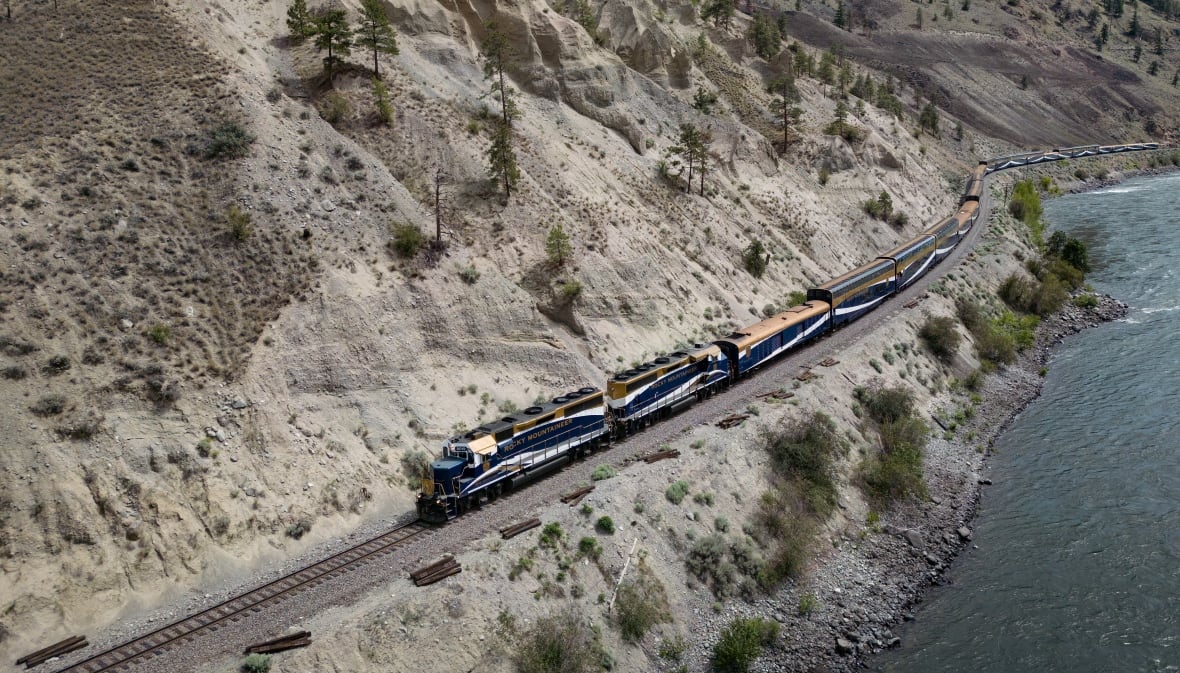MP wants passenger rail in B.C.'s Sea-to-Sky region as CN Rail pulls out
CN Rail said it has begun the process to discontinue operating the rail network north of Squamish

The MP representing B.C.'s Sea-to-Sky region wants to see passenger rail introduced in the booming region north of Vancouver, just weeks after CN Rail said it intends to discontinue its operations in the area.
CN Rail is responsible for the maintenance and upkeep of a portion of B.C.'s rail network between Squamish and Exeter, just northwest of 100 Mile House.
On July 11, the national rail operator said it provided notice of its intent to discontinue those operations, potentially opening the door for another operator of the railway line that is ultimately governed by the province.
While the announcement potentially jeopardizes an existing long-haul passenger service, the local MP and two mayors say it opens the door for commuter service in a rapidly-growing region and the option to ensure its resiliency going forward.
"I would say that Highway 99 is very much at capacity. We're seeing major congestion. We're seeing frequent, often fatal crashes in the area," said West Vancouver-Sunshine Coast-Sea to Sky Country MP Patrick Weiler.
"And it's having a major impact on the communities — not just in the Sea-to-Sky, but actually all the way down to creating congestion into Metro Vancouver. So ... there is a major need for alternative transportation options."
Weiler said the Sea-to-Sky region, which has been seeing an influx of residents ever since Highway 99 was expanded for the 2010 Olympics, has had its population grow by 60 per cent since then.

He said the region had regular passenger rail until 23 years ago, when provincial Crown corporation B.C. Rail ended operations. A year later, the then-B.C. Liberal government leased much of the province's operations to CN Rail.
Weiler said that the time was ripe for passenger rail in the area, given the existing infrastructure and the growth in the Sea-to-Sky region.

"That would have a huge impact — whether that's people commuting, tourists being able to visit, and otherwise," he told Amy Bell, guest host of CBC's On The Coast.
"And with this news of CN deciding that they want to discontinue the operations, it gives a year for people to come forward with ideas on how to do that."

Weiler noted that adding more transit to the Sea-to-Sky corridor was part of a list of priorities when the governing B.C. NDP and the B.C. Greens signed a co-operation agreement last December.
"The region's been studied to death about what exactly needs to be done," the Liberal MP said. "We just really need to see some action right now."
A spokesperson for B.C.'s Transportation Ministry said it would review CN's decision before considering its options.
Long-haul service could be in jeopardy
One passenger rail service already exists in the Sea-to-Sky area, but not on a commuter route.
The Rocky Mountaineer operates a luxury long-haul rail service called the Rainforest to Gold Rush route from North Vancouver to Whistler and further on to Quesnel, B.C., and then Jasper, Alta.
A spokesperson for the company said it was aware of CN's decision to eventually discontinue its operations in the Sea-to-Sky region.

"CN is responsible for maintaining the rail infrastructure along this route, including the rail, ties, bridges, and vegetation control," they wrote.
"Without CN's management of the rail line, we would be unable to travel on the route."
The spokesperson added that the company was reviewing its long-term options along the route, but the 2026 season of the long-haul train service would proceed as planned.
Mayors want conversations to happen
Jack Crompton, the mayor of Whistler, said that the loss of the Rocky Mountaineer would constitute a loss of a "tremendous tourism partner" for the resort municipality.
He said, however, that CN's decision to pull out of the corridor represented a big opportunity for the Sea-to-Sky region and that Whistler was paying close attention to what would happen next.
"Recreation is important, but for us, commuting and ground transportation is number one as it relates to this decision," he said.

Squamish Mayor Armand Hurford noted that the district has a major history of railway travel, with the Railway Museum of B.C. located there.
He said that it was important to ensure continued rail access to Squamish's port, which served as a critical route to transport cargo during the 2021 floods in southwest B.C.
"I think it's really important that we maintain operational status there, because this line does run through some incredibly challenging terrain," he said.
"And if the maintenance drops off, I think the fear is that it just will become cost prohibitive to reinitiate the service."
With files from Amelia John and On The Coast


